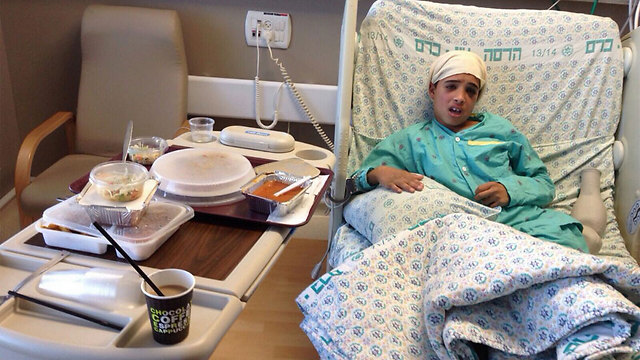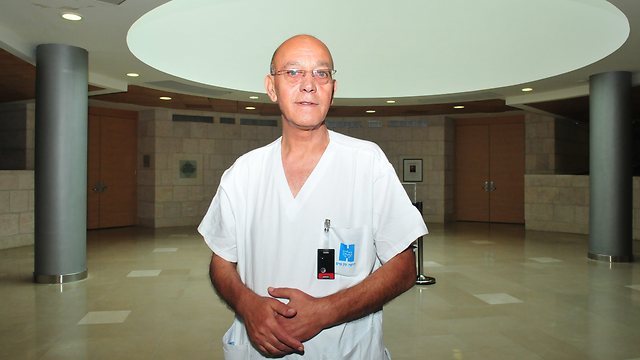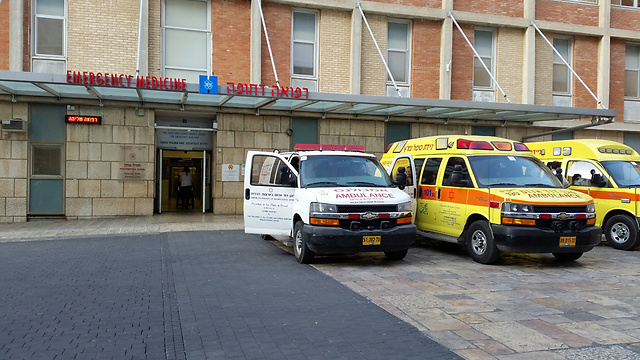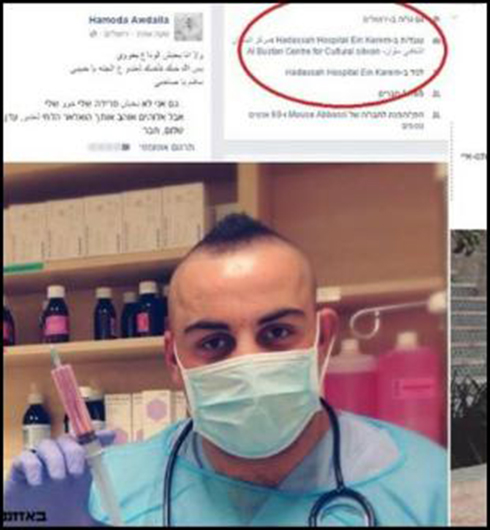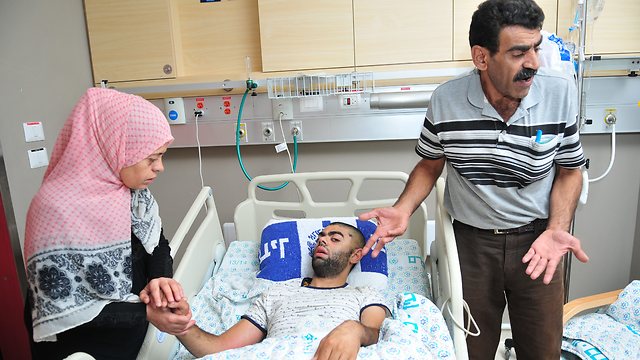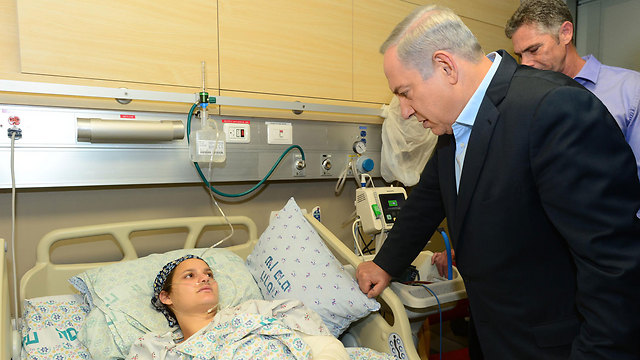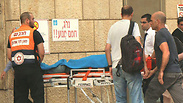
A fragile coexistence at Jerusalem's Hadassah hospital
Jerusalem's Hadassah Ein Karem hospital is an island of fragile sanity in an ocean of violence, where Arab and Jewish doctors work shoulder to shoulder to save the lives of both terrorists and victims of terror, regardless of the circumstances.
It's Tuesday afternoon last week and there is much chaos and commotion at the Hadassah Medical Center in Jerusalem's Ein Karem, two hours after the two terror attacks in the capital. Images from the scenes of the attacks are still flickering on the TV screens in the ER's waiting room. The urgent voice of news reporters mixes with the monotonous beeping of medical machines. Those in the waiting room, Jews and Arabs, ultra-Orthodox and secular - in a not uncommon Jerusalemite scene - stare at the screens and every now and again shoot embarrassed looks at one another.
Beyond the wall, in the trauma room, only thin curtains separate the victims of the terror attacks and Bilel Ranam, the terrorist from the attack in East Talpiot that very day, who is critically wounded.
The doctors at Hadassah, both Jews and Arabs, are fighting for the lives of the wounded, both victims and terrorists, pushing aside any thoughts or emotions.
The family members of one of those wounded in the East Talpiot attack arrive at the ER. The critically wounded man went into surgery as a John Doe. It was only later that his belongings were examined and his family members located. One of his daughters, her eyes shining with tears but her head held high, seems as if she is doing everything in her power not to break down. She goes in for an update on her father's condition. On her way out, her veneer of strength dissolves, and she falls to her knees with cries of pain.
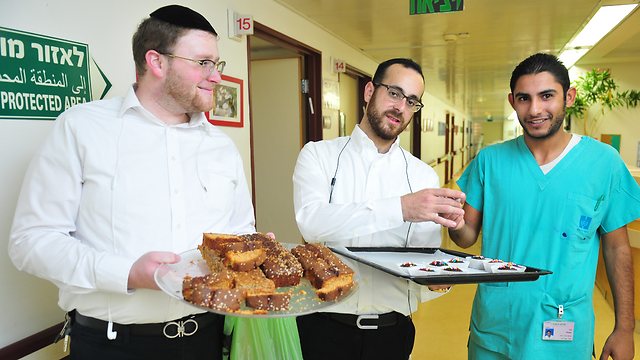
One of the doctors set to operate on the critically wounded man was Dr. Abed Khalaileh, a senior surgeon in the Department of General Surgery.
"The atmosphere isn't good these days," he says, inhaling slowly. "But at least at the hospital there is a different atmosphere. We work together, we provide treatment to all patients, no matter their religion or race, whether they're rich or poor, Israeli or not."
Are you able to distance yourself from what's happening outside while you're at work? From the circumstances behind the patient's injury?
"It's difficult, but possible. We each do our job. My job in this incident was to treat a Jew who was critically wounded. My colleagues treated the terrorist. We don't differentiate between those who are to blame and those who aren't. We work together, with professionalism."
With such a tense atmosphere, did anyone treat you differently? Perhaps one of your patients or colleagues?
"The attitutde I get from the patients is excellent and I haven't seen any change. When you do your job with devotion, you are being treated accordingly. Outside the hospital there's an atmosphere of fear, all of the civilians can feel the lack of security on both sides. Outside the hospital, no one sees that I'm a doctor."
How can we calm down the tensions? Do you have a prescription for that?
"I think people like me who work together, not just in the field of medicine, should speak up and show the good sides."
Down the hall, sitting on a stone bench, are the brothers Haim and Shmuel Krishevsky. Their father Pesach, 80, a known drummer in the Jerusalemite ultra-Orthodox scene, was moderately wounded after a terrorist ran over him on Malchei Yisrael Street and stabbed him with a butcher knife six times. Their cousin, Rabbi Yeshayahu Krishevsky, was murdered in that attack.
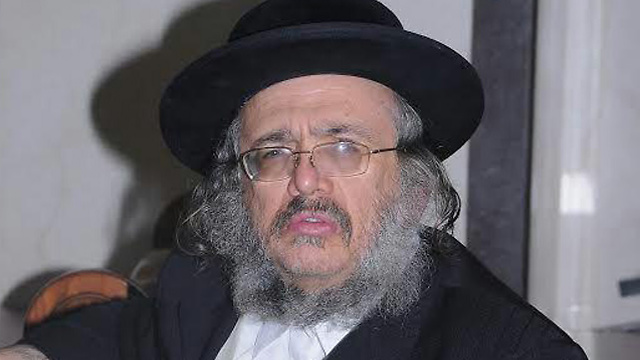
The terrorist, Alaa Abu Jamal, a Bezeq employee, also arrived at the hospital in Ein Karem and succumbed to his wounds.
"Our father is a strong man, both physically and mentally," says Haim, who lives in the Geula neighborhood and owns a factory producing tefilin. "He was stabbed in the nose, in his forehead, on the back of his head and in his hands. The cuts in his face are very deep, and he's going into surgery now."
On the other side of this wall, the doctors are fighting for the life of a terrorist.
"What do I care? What can I tell you, we have to stop provoking them. We have enough tensions as it is. All of the people murdered now, it's because of the Jews going on the Temple Mount. Even the halacha forbids it. What are they provoking them for? What good is it? I go to the Western Wall every day and see them going up on the Temple Mount. I'm very angry. Very angry."
And aren't you mad at the terrorists? Are only the Jews to blame? After all, there were terror attacks even when Jews weren't going up on the Temple Mount.
"May their name and memory be blotted out, but we can't educate the terrorists. We must not provoke them. The Jews are going on the Mount and the terrorists target the ultra-Orthodox. Because of the way they dress, the ultra-Orthodox make an easy target. It is true that each person is important to himself and his family, but I hurt for every Jew just the same. We need to stop this lawlessness. Those who go on the Temple Mount give others reason to kill us."
On that same bench, between the ER and intensive care, just a day earlier, sat the parents of Ahmed Manasra from Beit Hanina, who went on a stabbing spree in Pisgat Ze'ev and seriously wounded a 13-year-old boy who was riding his bike.
The parents raised hell demanding to see their wounded son, but were refused. Terrorists who have been arrested do not have the right to visitations from relatives. Not even when it's a 13-year-old terrorist, or a 17-year-old high school student like Farah Bakir, who is also hospitalized in Ein Karem after she wounded a policeman on Ammunition Hill, not far from the Israel Police headquarters, and was shot.
Instead of family members, the hospitalized terrorists have police guards posted in their room, and the hospital prevents the media from approaching them. On the list of patients available at the hospital's information desk, their names don't even appear - perhaps because of the fear someone will seek to take vengeance on them.
"We are not allowed to provide information about them," the guy at the information desk explains. "It's confidential."
'Like a snowball'
Several employees gather around the information desk, giving each other updates on the terrorist attacks."So far, thank God, we're feeling safe," says Kalifa Zafrani, an orderly at the hospital for 33 years. "But there is tension in the air. There could be an attack here as well. Do you know how many knives we have in the kitchen? Seventy percent of the kitchen employees are Arab. If there are more attackers who are employees like the terrorist from Bezeq or the municipality worker, then there might not be a choice but to separate the populations."
"We must not let them see we're afraid," one of the security guards tells Kalifa. "There's coexistence in Hadassah."
"There was coexistence in Bezeq as well," Kalifa responds. "But don't think I'm afraid," he says, looking at me with his blue eyes.
"Every Saturday for 25 years now I go on the same walk. From Baka, where I live, I walk through the Sultan's Pool to the Jaffa Gate, and I come out through HaGai Street at the Damascus Gate. Last Saturday I walked by the scenes of two terror attacks. Here, look at the pictures," Kalifa says, swiping through his smartphone and showing off a photo of a dead terrorist. "I'm addicted to this walk. Every Saturday, I walk for an hour. I love Jerusalem and I love East Jerusalem. I'm of Moroccan descent and the Old City reminds me of my childhood in Morocco."
Are you going to go next Saturday as well?
"Of course I will. After all, I have to. It's in my blood."
He has been escorting sick people for more than 30 years, Jews and Arabs, from the oncology department to their radiation treatment. "I love everyone here, and am tied to them. Don’t get me wrong, day-to-day, there are great ties here. As any Arab worker here, they love me."
Are the Jews and Arabs friends outside of the hospital too?
"Sometimes. Occasionally they come to weddings, but I don’t usually have the chance to go to their weddings. When I go for a walk in the Old City, there are typically some employees and patients who recognize me, they give me respect and love. 'Tfadal Kalifa,' they say when they meet me in the street. Here, go ask him about me," Kalifa points at one of the Arab employees walking nearby.
"Kalifa is great. They should make him hospital director," the employee says.
Maybe prime minister?
"Why not, he should run the country. He is a great person."
So prime minister, what do we do now? How do we end this situation?
"It's hard for me to predict what will happen. If our coexistence here at Hadassah could be projected outwards, there would be no need for leaders. Here at Hadassah you don’t hear employees cursing at each other, in light of the attacks. We are an island of sanity."
Even Ahmed Fahuri can't predict what will happen. "Trust me, I am asking myself the same question," Fahuri says. "It has no end. There is no leader or government here or there. If there was a real government, it would have ended a while ago. There are no leaders saying, 'let's put an end to this.' Mahmoud Abbas no longer controls the land, and truthfully, I also don’t feel any affiliation to him. There is no expiration date for this chaos. It continues and grows, worrying everyone. I'm at work but I'm thinking about home. I can't sleep. I have younger and older kids."
Fahuri, 60, has worked at Hadassah for two months as a nursing assistant. He is especially worried because he lives in the Old City, near the Lions' Gate – which has become the scene of multiple attacks.
What started the chaos?
"Al-Aqsa. What connection do I have to the Western Wall? What would I do there? The same goes for the Temple Mount, what do Jews have to do with it?"
The Jews have historic and religious ties to the Temple Mount.
"So why can't I visit the Western Wall? If you were to escort me now to the Western Wall, they would not allow me in. I go up to pray at Al-Aqsa quite frequently. I see how Muslims are prevented from entering the mosque on weekdays, while the Mughrabi Gate is open for Jews to enter the Mount. It is frustrating, and isn’t fair."
Does it justify the knife attacks?
"I didn’t say it did. But it's a ticking time bomb. It’s a snowball, growing and growing, and both you and I pay the price."
Is it symmetrical? Who is more afraid to walk around Jerusalem, Jews or Arabs?
"Both Jews and Arabs. I am scared. Yesterday I walked past a group of 14-to-15-year-old kids. I heard what they were saying. If you try to fix your pants or socks, they shoot you. That’s what's happening right now."
Do you think they shoot Arabs for no reason?
"I am very concerned. Everywhere I go, there is a lot of police. I think a million times before every movement I make, because if it put my hands near my pockets, they will think that I am pulling out a knife – and will shoot me without thinking twice. I can understand them, because maybe I really am about to pull out a knife. But I also live in fear."
Was there an incident in which Arabs were shot for no reason?
"Let's not get into that. I'm not just afraid on the street, but here at work too. I'm afraid that if I go out for a smoke, some extremist will attack me for revenge. I'm afraid to walk around the hospital with my name on my Hadassah tag, an Arab name. I prefer to walk around with my tag backwards."
'Death to Arabs' from friends
Subhi Koz, 20, a nursing student from Shuafat who has worked at Hadassah for a year, joins the conversation.
"Yesterday we were driving home in the hospital shuttle after a long work day, and nurses who work with us looked at us and said 'Death to Arabs,' and 'why are you at Hadassah, you should be fired,' he says. "We plan on filing a complaint. How can medical professionals say such racist things?
"During work itself there is no racism. I take care of Jews, Arabs, Russians - everyone is the same. But not everyone respects that. I walked past a police officer with a stab wound in the emergency room a few days ago, and he began yelling that he hates Arabs. I told him he should respect the place, and that I was also wearing a uniform, but in the end I just walked away – it was the end of my shift.
"I have Jewish friends on Facebook and from outside of work too, and I typically go out with them on Jaffa Street. But sadly, two of my Facebook friends have written posts including 'death to Arabs,' so I had to unfriend them. I hope the situation ends soon. My dream is to live in peace, but sadly that won’t happen. We feel very unsafe. When I leave my house, I don’t know if I'll come back. We are afraid of the Jews, and the Jews are afraid of us. Netanyahu and Abbas sit in their chairs and people are killing one another. What do they care if the country goes? They could stop this."
The conversation is interrupted when two young ultra-Orthodox men enter the corridor in the oncology department with slices of cake in their hands. “Let’s have a little happiness in honor of the beginning of the month,” they say. But even the sweetness of the cake cannot bring a smile to Koz’s worried face.
“We came into this world to live,” he says. “Everyone has a heart. As a nurse I treat every person without checking their identity card to see who they are. We are all human beings.”
There are those who say that someone who can take an ax and strike an 80-year-old on the head is not a human being. Where does such hatred come from?
“It all depends on how someone is educated by their parents. One doesn’t need to expose their child to the news. One mustn’t speak about hatred in front of children because whatever you teach them will come back up later. But the problem starts with the leaders.”
How can we calm the waters?
“With Jews staying away from Al-Aqsa and all of us going back to living quietly. If Abbas doesn’t know how to rule and doesn’t manage to stop this, we need to replace him. And Netanyahu, instead of calming things down, tells citizens to go out into the street armed. For what? They are just shooting at young Arabs. Take Fadi from Issawiya – he was just walking down the street, coming back from work, and some religious people started cursing at him. He went to the police for protection, they thought that he had a knife even though he didn’t, and they killed him. He did nothing and they killed him. So why not kill me too when I’m on my way home from work? I’m scared.”
The fear in his eyes is difficult to witness. But there is a gaping chasm between the facts as Koz sees them and the reality. Fadi Alloun stabbed a 15-year-old next to Damascus Gate the week before last and was shot after a chase, during which he had a knife in his hand. Palestinian media outlets presented him as a victim and this is how Koz sees him, too.
One Arab employee, who worked as an orderly, was fired last week after writing a Facebook post in which he expressed solidarity with the terrorist Fadi Alloun. “May God have mercy on you,” wrote the orderly, and posted a photo of Alloun. The employee was fired following a complaint from a right-wing activist.
The 13-year-old Ahmed Manasra is also presented as a victim, the new Muhammad al-Durrah. “I heard that he didn’t stab anyone,” Koz says. "I didn't see, I don't know. But many of us are saying that he isn't a stabber. From what I saw in the video, he didn't stab anyone. There was no blood on the knife, so how could he have stabbed someone? Why do the police not have a film showing him stabbing? I don't know."
The day after we spoke videos of Manasra were published that made it clear he had a knife in his hand, but Koz – as is so typical of the Rashomon-esque nature of Israeli reality – sees things differently. "In Afula, too, they just shot a girl from Nazareth," he says. "She had glasses in her hand, not a knife, and she had her hands in the air, so why shoot her and not arrest her? Go to the ninth floor. There is someone injured lying there, Mohammed from Ramallah. They just shot him. They've even released him from arrest here. He was just on his way to work and they shot him."
'Humanity responds to humanity'
On the ninth floor we locate Mohammed's father, Othman Ziada. Othman believes at first that we are representatives of Peace Now, with whom he has a meeting scheduled, but we quickly clarify that we have come to interview him for a newspaper. He lets us into the room of his wounded son – a youngster in his 20s with a head injury, constrained to the bed, confused and hardly speaking.
"Mohammed works in an electrics store," his father says. "He was just going to bring something to the shop," he claims. "There were youths throwing stones next to him, but he was not involved. Suddenly an undercover officer fell on him and tried to arrest him. Mohammed tried to resist and they put a bullet in his head. Here, look. It went in here and came out here," Othman says, pointing at the stitches in his son's head.
"Since I heard about this I don't eat, I don't sleep, I don't shower. It happened on Wednesday last week. On Thursday they gave us a permit to get out of Ramallah in order to come to the hospital. For five days they wouldn't let us see him. They performed surgery on his head and after that he had another operation. They put handcuffs on him. Here, look at the marks on his hand, even though he's wounded. Yesterday the lawyer arrived and they released him. They just arrested him. He didn't do anything and they ruined his life. Half his body is paralyzed; how can he have children? We want the governmnt to at least give him money for treatment."
Othman learned Hebrew through different jobs he has had in Israel, and also while serving time in an Israeli prison. "At the age of 23 I was in jail for 10 months. They arrested me for throwing stones. I only threw stones, nothing more than that, honestly," he laughs. "For that I have no entry permit to Israel. I hadn't been in Israel since 1999. Now they gave me a special permit. I've ordered my children not to throw stones. Why? What for? It only brings problems."
Have Othman's instructions worked, and is his son really just a victim who was caught in the riots by accident? It's not at all certain. A security official stated that "Mohammed Ziada is a central agitator who was standing at the front of an especially violent riot in Ramallah and throwing stones and Molotov cocktails. A full investigation into the incident has yet to be completed, as the soldiers are too busy to submit the evidence for the class charge – for now. Unfortunately, there is sometimes a gap between the reality in the area in which rioters that endanger our soldiers are caught, and the ability to bring clear permissible evidence to court. But at the end of the investigation there will be evidence against Ziada."
And how is the treatment here at Hadassah, Othman?
"Fantastic. They treat Mohammed very well, both the Jewish and the Arab employees. I have no complaints on that front."
"A hospital is like a bubble. If the State of Israel was managed like Hadassah there would have been peace a long time ago," says Dr. Amichai Meirovich, a doctor in the oncology department. "We all work together to save human life, everyone for everyone. The Arab doctors treat Jewish patients in the same spirit that they treat Arab patients. But the truth is that I hear the Arab doctors, and they're afraid. They ask how they can leave the house. When all the fanatics on both sides are coming out, we're here to give care to the sick."
How can we take this coexistence outside, into the streets of a country in conflict?
"The prime minster needs to release a clear statement that there is no intention to build another Temple and that any statement to this effect is a big lie. He also needs to remove the fanatic Jews who are praying on the Temple Mount. That's my opinion. This provocation is not helping. We need now to calm the waters and not give material for preachers in mosques. We need to lead with moderation. Maybe humanity will be answered with humanity."
This difficult day for Israel has ended in Jerusalem and at the Hadassah Medical Center in Ein Karem with a moment of hope. Adele Bennett, who was seriously wounded two weeks ago in an attack on HaGai Street in the Old City's Muslim Quarter, has been discharged. During the attack, her husband Aharon was murdered in front of her eyes, and her two-and-a-half-year-old son wounded. He was released from hospital along with his mother. "I am leaving wounded and torn," she says.
"I was stabbed 17 times in my body and a thousand times in my soul – wounds that will never heal," she continues. With a sweet and then tortured smile she parts from the team, and goes home on a long path to recovery.










